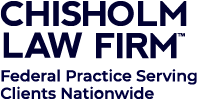Nonprofit organizations play a crucial role in addressing social and community needs, relying on the generosity of donors to fund their missions.
In addition to large fundraising events, soliciting individual donations is a fundamental part of a nonprofit's operations. To avoid any legal mishaps it is essential to understand the intricacies of solicitation licenses.
But that's where Chisholm Law comes in.

What is a Charitable Solicitation License?
A solicitation license is a legal requirement that nonprofits must adhere to when seeking donations from the public. This webpage will shed light on what solicitation licenses are, why they are crucial for nonprofits, and how legal support can help organizations navigate this complex landscape.
What is the Difference Between Solicitation and Fundraising?
Although fundraising and solicitation are often used interchangeably, they are distinct concepts in the nonprofit world.
Fundraising typically refers to the broader spectrum of activities aimed at generating funds for charitable organizations. It includes various strategies, such as events, grant applications, and online campaigns.
On the other hand, solicitation specifically refers to the act of asking for donations directly from individuals or entities for charitable purposes. This might involve sending out solicitation letters, making phone calls, or using email campaigns. It's important to understand the difference, as solicitation often triggers the need for a solicitation license.
Do You Need a Solicitation License in All States?
The requirement for a solicitation license varies from state to state, and the details can be complex and cumbersome to navigate.
Nonprofits must typically obtain a solicitation license in each state where they intend to solicit donations. Some states have specific thresholds, both in terms of fundraising amounts and frequency of solicitation, which trigger the requirement for a license. Failing to secure the necessary licenses can lead to legal trouble, fines, and potential damage to your organization's reputation.
Given the varying regulations and requirements, seeking legal assistance is vital to ensure compliance with each state's laws and regulations. Contact Chisholm Law today and get the answers you need to obtain your solicitation license!
How Do Charitable Nonprofits Solicit Donations Legally?
Soliciting donations requires careful planning and compliance with legal regulations.
- Understand State Registration Requirements: As mentioned earlier, different states have various requirements for solicitation licenses. It's essential to research and identify where your organization needs licenses.
- Registration and Compliance: Once you know where you need licenses, you'll need to complete the necessary registration processes, which can be complex. From navigating state charitable registration forms to understanding donor tax rules, legal support can help ensure you meet all requirements.
- Fundraising Solicitations: Create a clear, ethical, and compelling solicitation message that resonates with your target audience. Ensure your solicitations follow the law and comply with any state-specific regulations.
- Recordkeeping: Maintain detailed records of all your solicitation activities, including donor information, fundraising methods, and financial reports. This documentation is crucial for audits and compliance.
- Consult Legal Professionals: Seek the guidance of attorneys experienced in nonprofit law to navigate the complexities of solicitation licensing. They can help you understand the specific requirements for each state and provide ongoing support to ensure your organization stays compliant.
Want to learn more? Explore all of our fundraising services:
Are Charitable Solicitation Registrations Different in Every State?
Yes, charitable solicitation registrations are different in every state.
Each state has its own set of laws, regulations, and requirements governing charitable solicitation, making it a complex and challenging landscape for nonprofit organizations to navigate as they attempt to obtain a license. Here are some key points to consider:
- Varying Regulations: The rules and regulations surrounding charitable solicitation can differ significantly from one state to another. These differences encompass everything from the types of organizations that are exempt from registration to the registration fees and reporting requirements.
- Thresholds and Triggers: States often have thresholds or triggers that determine when a nonprofit must register for solicitation licenses. These thresholds can include the amount of funds raised, the frequency of solicitation, or the use of paid solicitors. The specifics vary from state to state.
- State Registration Forms and Documentation: The required forms and documentation, as well as the submission deadlines, can vary widely. Failure to provide the correct information or meet deadlines can result in penalties and legal issues.
- Compliance Challenges: Compliance with the unique requirements of each state can be a daunting task for nonprofits operating nationally or across state lines, especially when it comes to meeting renewal deadlines. Many organizations find it challenging to maintain compliance in multiple states simultaneously.
- Changing Laws: State laws and regulations governing charitable solicitation are subject to change. Staying informed about these changes and ensuring ongoing compliance is a significant undertaking.
Given the complexities and variations in charitable solicitation registration across states, nonprofit organizations are strongly encouraged to seek legal support. Legal professionals specializing in nonprofit law can provide valuable guidance on understanding the specific requirements in each state, assist in the registration process, and help ensure ongoing compliance.
By working with experienced attorneys, nonprofits can avoid legal mishaps and maintain a strong reputation while engaging in charitable solicitation activities across multiple states.
Chisholm Law: Helping You Navigate Charitable Registration
Solicitation licenses are a critical aspect of nonprofit operations. Failing to obtain the required licenses or comply with state regulations can lead to legal complications that may jeopardize your organization's mission. Seeking legal support is not just advisable. It's vital to avoid legal mishaps and maintain your nonprofit's reputation while effectively soliciting donations to support your cause.
Chisholm Law is equipped with the resources and know-how needed to help our nonprofit clients seamlessly navigate obtaining a charitable solicitation license. Contact us today to get started!
“We Are Proud Of Our 100% Success Rate For Our Nonprofit Filings 99.9% Success Rate for Trademark Filings Since 2010.*”
Call us today!
1-800-254-6140
Quick Links
About Us
Resources
1-800-254-6140
info@chisholmfirm.com
1-800-254-6140
info@chisholmfirm.com

